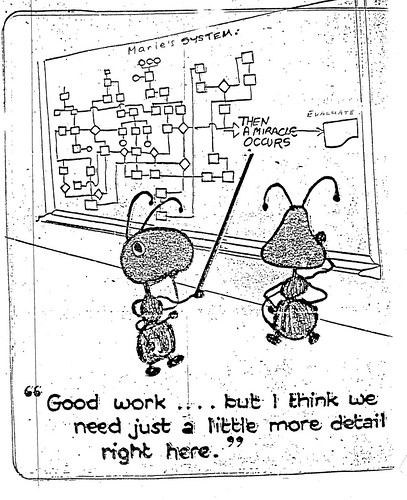I read an article about writing . It contained information about how to succeed in one particular genre. It included quotes and tips from some established experts, and outlined all the things you need to succeed (establish a website, keep writing, keep submitting work to magazines and so on) and how to hone your craft. It then went on to say how to maintain a good relationship with your first client.
Did you notice what was missing? Nowhere in the article does it tell you how to acquire your first client – and that’s the most difficult bit! Advice like create a website, keep submitting, be cordial but professional: all that is sound advice, but it’s generic. If I want to write newspaper ads, I know I have to build up a portfolio of work, I know I need to establish my expertise and publicise myself. But how do I actually get that first client? How do I pick up that very first commission? Is there a website of newspapers looking for ad writers? Is there an agency for newbies in the field? Where do I start?
I find this happens a lot in education circles too. I’m sitting in a meeting, and the Chair says “That’s agreed then. By next Tuesday we’ll have the information we need about our pupils’ use of the internet at home.”
Will we? Who’s going to be researching and compiling that data? Or will it happen by Divine intervention? Or is the Chair waiting for one of us to say “How?”, so that he can respond, “Good point. OK, as you’ve raised that question, you’d better do it.” (See my article Formalising Meetings for suggestions about how to run a meeting professionally and effectively.)
Some years ago I came across a great cartoon depicting exactly this situation.

(Unfortunately, I don’t know to whom the copyright belongs and therefore who to ask for permission or to accredit, so if you happen to know let me know and I’ll contact them.)
Details please
A couple of years ago I was working with several schools helping them to improve the way they managed their technical support for educational technology. In every school, I had this conversation:
Me: What happens when something goes wrong with a laptop?
Teacher: We report it, and a technician fixes it.
Me: Yes, but what do you do?
Teacher: We report it, and a technician fixes it.
Me: Yes, but how do you report it?
Teacher: We fill out a report.
Me: How?
Teacher: We fill in a form.
Me: What form?
Teacher: The technical fault report form.
Me: Where’s that kept?
…
OK, I’ve exaggerated slightly for effect – but actually only slightly: I found that getting the information I needed about the process was like getting blood from a stone. The reason isn’t hard to see: the people who use the process every day either no longer notice all the details or assume that everyone knows how it works. But the detail was important because it was often the case that a problem arose because there was a step missing somewhere.
So my question and challenge to you (and which I set myself every time I write) is:
What is the person listening to you or reading your words actually supposed to do?
For example:
Do the teachers you’ve told to borrow a class set of tablets know how to do so?
Do your colleagues in your team meeting know how to get to the grades data you’ve set up in the management information system?
Do your students know where to email their homework or how to submit it digitally?
Put yourself in their shoes. Would you know what to do if you were listening to you?
If you enjoyed this post, why not subscribe to my free newsletter, Digital Education?

